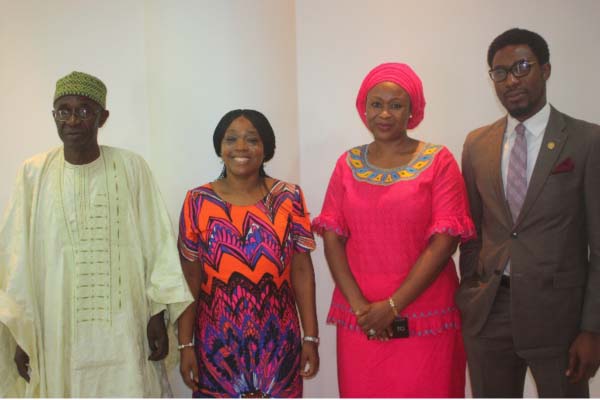
There
is nothing more pleasurable to the ear than to hear that a particular law has
been put in place to protect and promote the rights of the most vulnerable
group in the society, community, nations and the world at large.
One
could not count the vulnerable groups or people or individuals among us and
forget children, who we treasure so much and will do anything and everything
possible in this world to have them and call them ours.
We
all know that a woman will go crazy if she stays in her matrimonial home for
just one year without hearing the cry of a baby in her house, a beautiful baby
girl or a handsome little man she can placed on her lap, bathe him or her and
enjoy that motherly bond between her and that child she called hers.
If
a law is put in place to protect the best interest of that child to enable her
grow and realized her full potential, we can say nothing other than “Bravo!” to
the National Assembly for amending the Children’s Act 2005 and making child
marriage illegal in The Gambia.
Criminalizing
child marriage is one of the greatest gifts of 2016 from the National Assembly
to the children of The Gambia.
It
is obvious that a child who needs a mother’s care does not need a man to
torment her in the name of marriage, because she is a child and she can only be
a child, not a bride.
The
Children’s Amendment Bill 2016 makes the marriage of any child below the age of
18 illegal in The Gambia, with a penalty of 20 years imprisonment for the
parents, husbands and conspirators.
According
to UNFPA-UNICEF joint statement on the ban, “Child marriage is a violation of
the rights of girls and an obstacle to attaining the UN Sustainable Development
Goals, especially Target 5.3 which calls for the elimination of all harmful
practices, including child, early and forced marriages and female genital
mutilation.
Unfortunately,
many girls in The Gambia are at risk. Latest figures show that over 40 per cent
of women aged 20- 49 in The Gambia were married before the age of 18 years,
while 16 per cent of women of the same age cohort married before they turned
15.
Child
marriage often prevents girls from enjoying social and economic opportunities,
contributes strongly to the continued cycle of poverty in poor communities, and
perpetuates the high incidence of infant and maternal mortality.
Furthermore,
many girls are at risk of developing fistulas during delivery, which invariably
leads to social stigma and isolation.
We
all know for a fact that child marriage mostly occurs in the rural areas, and
most of the people involved are from the grassroots level and not educated to
enable them read and write or even understand what the law says about them.
Since
the Children’s Act is amended, enforcement may follow suit and that being the
case the relevant authorities concern in partnership with the UN System in The
Gambia, in particular UNICEF and UNFPA, as well as NGOs and CBOs such as CPA,
should work together and ensure that our mothers and fathers, as well as the
traditional rulers who spearhead these ceremonies are sensitized on the bill.
Kunle
Adeniyi, UNFPA The Gambia chief of operations at the head of office, said “the
silenced voices of the thousands of young women and girls forced into marriage
before their eighteenth birthday signify complacency and discrimination.
Majority are denied the opportunity of growing as human capital, as an asset
for our communities and country, and this unfortunately translates to lost
opportunity. This ban and enactment of a law criminalizing Child Marriage is a
bold step in ensuring that every girl child in The Gambia reaches the pinnacle
of her potentials.”
We
should translate the bill into the local languages that the people understand,
as well as about the effects of child marriage, which will be an added
advantage in ending and leading to the total eradication of child marriage in
the country.
We
should know that these are practices that are deeply rooted in our traditions,
and a man or woman at the grassroots level in justifying his or her actions
will tell you that they were married when a child.
Thus
an evidence and research based campaign should be recommended in dealing with
the people in the rural areas.
I
have seen and heard a girl-child in one of the villages say to me: “All my
mates have gone to their husbands’ houses, and I am the only one around with no
man to come for me yet.”
I
looked at her and asked her if she really wants to get married, and she
answered excitingly: “ Yes”.
So
I wonder how they are brought up in those areas, because the mentality they
have is that they should get married at a tender age.
Fighting
against that mentality of our girl-children in the rural areas is going to be a
challenging task, because this is a situation where they themselves want to get
married.
Hon.
Minister of Justice Mama Fatima Singhateh said: “This is very important,
because it will help us ensure the protection and security of our children’s
future. But law is not the only cure to the social problem.”
Since
the practice has been going on for decades and there are lots of survivors out
there, when we talk of sensitization we should also speak for rehabilitation
for the survivors to have a decent and a meaningful life so that they can be
fit for society again.
A
child marriage survivor living in isolation, trauma and being stigmatized and
discriminated on a daily basis will defeat the purpose of the campaign.
In as much as we want to end the practice,
when we budget to sensitize the people, we should equally budget for the
survivors and try to locate them wherever they are to help rehabilitate them
back to society.
Bringing
forward survivors of child marriage or travelling with them anywhere during the
campaign is not bad, but too much exposure is not also good for them because
what they need is proper care and rehabilitation; so that even if their stolen
childhood is not returned to them, they can at least be compensated with
something making it worth living and feeling alive again.
They
have gone through something worse than death itself, and what they need from us
is love, care, support and not too much exposure.



